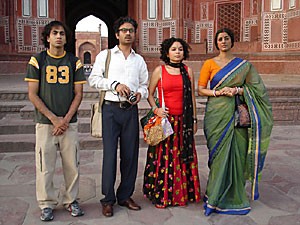“”The Namesake”” is the title of a book that’s been on the tongues of many reading groups for a while. Jhumpa Lahiri’s successful novel tells a moving story of how first-generation Americans struggle to find their cultural identities and where they fit into in society.
Do we have to lose a part of ourselves to be truly American? This an important question that we see rising, even with the current immigration problems on our border. Smart cookies in Hollywood saw a potential for a winner and translated the novel into a film.
The tradition in India is for parents to set up young men and women in arranged marriages. Ashima (Tabu) is paired off to Ashoke (Irfan Khan), a young male engineer who’s getting his Ph.D in America.
Marrying Ashoke means moving to America, pulling Ashima away from everything she knows. There’s quite a contrast between the colorful, noisy India and the dark, gloomy New York City. The two are alone and are slowly brought together – not by love at first, but because they’re the only ones in the area who have an understanding and love for Indian culture.
Once they start a family together, the two try to bestow upon their young children affection for the old country. As any young kids would do,
The Namesake
Rating: PG-13
Length: 122 minutes
Prouction Company: Fox Searchlight
their son Gogol (Kal Penn) and his sister want nothing to do with what their parents say and express disinterest.
Trips back to Bengal are seen as arduous and uninteresting. The children try to separate themselves from the culture of the old world until their father dies. They then realize that maybe having an appreciation for their family, their ancestors and the old ways isn’t such a bad thing after all.
The problem with any movie based on a book is that the film version will always leave something out. The “”Harry Potter”” movies are a great example of this: Part of the magic of those books is the brilliant description of the wizarding world. The movies can only really focus on the main events due to lack of time.
One of the pivotal parts of the book is Gogol re-embracing Indian culture once his father passes away. The movie only shows main events that may hint at this. It doesn’t really give a full view of how Gogol tries to distance himself as a young man from his traditions. Without that, it’s hard to get an understanding of the re-encompassing of his culture after his father’s death. It also takes away from the parallel path of his wife who wants to get further away from the Indian culture that she keeps being brought back into.
Turning a book into a movie is like trying to use a small flashlight trying to light up a large ballroom. No matter where you move it, there will always be some parts you can’t see. Without being able to see the whole picture, it becomes very frustrating and leaves you, well, in the dark.









